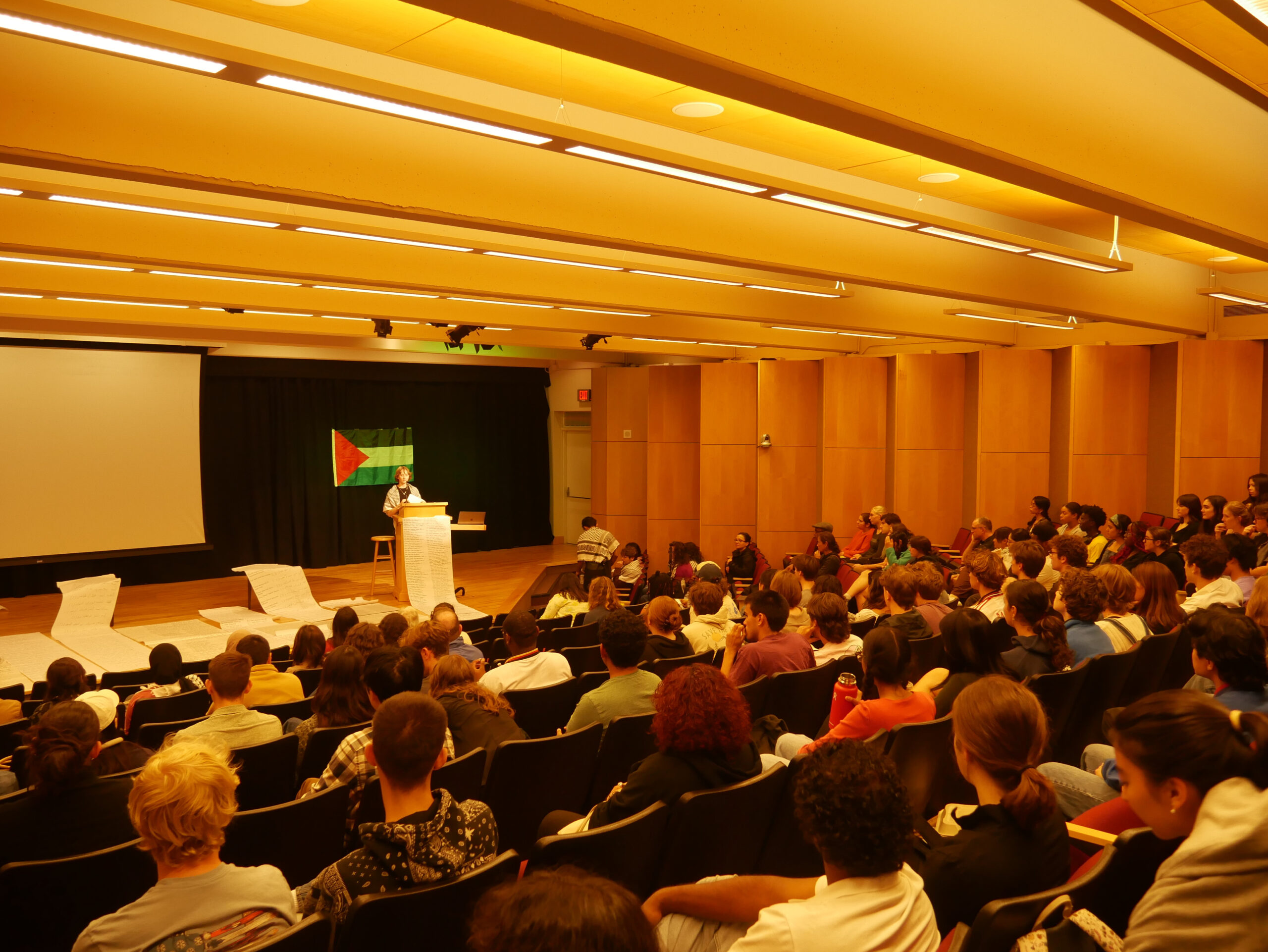SJP hosts teach-in on “One Year of Genocide”
October 25, 2024
 Isa Cruz
Isa CruzLast October, Students for Justice in Palestine (SJP) hosted a teach-in on the immediate escalation of violence against Palestinians following Hamas’s October 7 attack. In the year since, the Israeli military has killed at least 40,000 Palestinians—20 times the number killed at the time of last year’s teach-in—with many estimates placing the death toll at higher than 100,000.
On Tuesday, SJP held a teach-in entitled “One Year of Genocide,” during which student speakers illuminated the violence of the past year and situated it in historical context. The speakers made clear the ongoing nature of genocide in Gaza, citing estimates by human rights groups that the Israeli military kills 250 Palestinians each day. Eisa Rafat ’25, a member of the SJP steering committee, said that the teach-in sought to show Bowdoin community members gathered in Kresge how they might grapple with the continued violence.
“When we were planning the teach-in, we wanted to cover the events that have happened in the last year to recap the brutality that the Palestinian people have faced. And we also wanted something that wouldn’t cause students to feel further away from the issue,” Rafat said.
The hallway leading into Kresge Auditorium was filled with sheets displaying the names of Palestinians killed in the conflict. The names, provided by the Gaza Health Ministry, came from a 900-page list and were handwritten by SJP. Dozens of additional sheets of names covered the stage in Kresge as student leaders donning keffiyehs rose to speak.
“There were a few minutes right before the teach-in started that I could feel the weight of the room,” Rafat said. “That was mainly because of the names that we had displayed on the stage and on the walls surrounding the auditorium.”
The first speech, entitled “The Tension at the Heart of Zionism,” explored the origins of the state of Israel, framing it as a colonial project. The speech traced the century-old contours of the continuing crisis: though many sought to form a Jewish state in pursuit of equality, they often deepened inequality in the region by displacing and dehumanizing Palestinians.
“Anyone who understands the Palestinian cause knows that this didn’t start a year ago, that this has been an ongoing struggle,” Rafat said. “This is an invitation for people to go and understand the history. That means understanding Zionism, its founders and its framework.”
Understanding historical moments like the Nakba—the 1948 mass displacement of Palestinians—has been key to many SJP actions over the past year.
“With last year’s teach-in … a lot of [the] conversation was trying to understand how something of this scale was possible,” Rafat said. “That’s a very difficult thing to do without an understanding of the last 70-plus years.”
Sean Kramer, the postdoctoral curatorial fellow at the Bowdoin College Museum of Art, appreciated the historical framework established within the speeches.
“I was very impressed. Every single speech was very clear and held deep historical research. That’s one of the reasons I was coming … for my own information,” Kramer said.
Speakers characterized the continuing violence as apartheid, highlighting the particular denial of access to medical care for Palestinian people by the Israeli state. Fitting with the United Nation’s determination that “Israel has committed … acts of genocide,” SJP leaders spoke to the genocide and scholasticide ongoing in the destruction of schools and universities, as Israeli military officers continue to dehumanize and brutalize Palestinians in Gaza.
“It’s just calling it what it is. There are people that, to this day, continue to deny that this is a genocide. One of the things that’s very helpful is not just calling it a genocide but understanding why it qualifies,” Rafat said.
Luisa Wolcott-Breen ’25 said speeches which contextualized the discursive labeling of genocide in Gaza were helpful to her understanding of the conflict.
“I think the breakdown of the past year was immensely helpful. Quotations from different leaders in the Israeli military showed the language that they were using and clarified the situation as a genocide,” Wolcott-Breen said.
The final speeches centered on the potential for the Bowdoin community to take a stand against genocide. Speakers drew upon archival research on Bowdoin students’ organizing against apartheid in South Africa. The College divested from South Africa in 1987 following a student referendum, years of substantial student protest and the creation of a temporary committee. Drawing parallels to the past, speakers on Tuesday criticized the present administration’s lack of investment-related action in response to the solidarity referendum, which passed in the spring and called for transparency and halting future investment in defense funds.
The teach-in ended with SJP leaders challenging the Bowdoin community to further mobilize. Leaders encouraged continued pressure toward the recognition of the demands of the referendum and, eventually, divestment from weapons manufacturers.
“We’re really trying to remind people how close we are to this goal, and that it requires people to show up. It requires people to be dedicated, disciplined and willing to work through the issues,” Rafat said.
Wolcott-Breen noted her hope to learn and engage more with SJP in her final year at Bowdoin.
“Staying educated on what’s happening in Palestine is a really important topic,” she said. “I think it’s my obligation as a student.”
Editor’s Note: The names of the speakers at the teach-in have not been included in this article out of concern for their privacy and safety.

Comments
Before submitting a comment, please review our comment policy. Some key points from the policy: